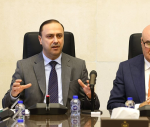You are here
Jordan, Germany see ‘untapped potential’ of renewable energy to boost cooperation
By Dana Al Emam - May 14,2017 - Last updated at May 14,2017
AMMAN — The fields of renewable energy and energy efficiency are of particular importance for boosting business relations between Jordan and Germany, stakeholders from the two countries agreed on Sunday.
Speakers at the second Jordanian-German Renewables Day highlighted the untapped potentials that can merge Jordan’s plans to increase the percentage of renewable energy in the energy mix and Germany’s expertise and know-how as a world market leader in the sector.
The event, which mainly covered photovoltaics and energy efficiency in buildings, is a platform for the business community in the two countries, including six leading German companies in the field, to exchange knowledge and discuss possible future partnerships and investments.
Andreas Hergenrother, CEO of the German-Arab Chamber of Industry and Commerce, said Germany is the fourth largest supplier of exports to Jordan and the first European supplier.
He noted that cooperation between Germany and Jordan has increased by 14 per cent during the first two months of this year.
Meanwhile, Hergenrother said there are still a lot of untapped potentials for the future, particularly in photovoltaics and energy efficiency in buildings, which comprise up to 43 per cent of overall energy needs. He voiced Germany’s keenness to support Jordan’s plans regarding renewable and sustainable energy.
He said Germany has increased the renewable energy share of its overall energy mix from 6.3 per cent in 2000 to nearly 34 per cent in 2016.
Ralf Schroer, deputy head of mission at the German embassy in Amman, said energy is a potential field to enhancing bilateral trade relations, noting that annual German exports to Jordan amount to around 800 million euros, while Jordanian exports to German are only a couple of million.
“There is a lot that can be done in Jordan to improve energy efficiency,” he said, citing further need to decentralise production, boost renewable energy infrastructure and digitise energy-related processes.
For his part, Mohammad Alshoha, board member of the Jordan Chamber of Commerce, highlighted the sector as a national priority, citing needs to enhance scientific research on renewable energy, boost the use of technology in the sector and support small renewable energy projects.
Through a legal framework that encourages investments in the renewable energy sector, Jordan would be able to attract investments to generate 1,600 Megawatts (MW) through solar and wind energy by 2018, with work under way on other projects that will generate 600 MW through wind energy.
Brend Wollwerth, a consultant for the German Energy Solutions Initiative of the Federal Ministry for Economic Affairs and Energy, said renewable energy is currently used in Germany to generate electricity for households, as well as industry and transportation.
In addition to adopting renewable and green options, Director of the National Energy Research Centre Walid Shahin said Jordan is in need of a culture of energy saving, which can reduce energy consumption by 20 per cent in the transportation sector and by 16 per cent in households.
He noted that the national plan for renewables, set to comprise 10 per cent of the energy mix by 2020, is necessary to address the annual 7.4 per cent growth in electricity demand and the annual 5.5 per cent growth in primary energy demand.
A delegation of German experts in renewable energy and energy efficiency will visit the Kingdom from May 14 to 16 to discuss possible partnerships with Jordanian counterparts.
The event was organised by the German-Arab Chamber of Industry and Commerce, in partnership with Mittelstand Global, the Renewables Academy, EDAMA Association, the Jordan Green Building Council and the Jordan Chamber of Commerce.
Related Articles
AMMAN — Jordan is the leading Arab country in renewable energy and the potential for more projects is greater, officials and experts said Mo
AMMAN — The MENA Europe Future Energy Dialogue (MEFED), scheduled to take place between June 8 and 9 at King Hussein Bin Talal Convention Ce
AMMAN — During the Jordanian-German Economic Forum, President of the Amman Chamber of Industry (ACI) Fathi Jaghbir has called for enhancing















